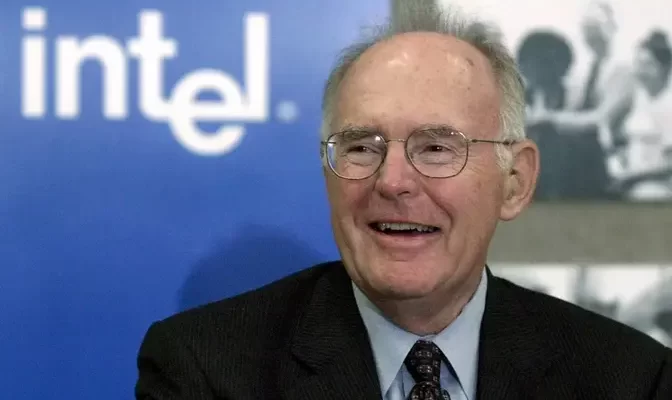In 1965, Gordon Moore made a simple prediction about how quickly engineers would be able to boost the capacity of computer chips that set the pace of progress in the digital age. He died at the age of 94.
Intel and the Gordon and Betty Moore Foundation reported Friday that Moore had passed away at his Hawaii home. He made his famous observation – now known as “Moore’s Law” – three years before Intel was founded in 1968. It appeared among a number of articles about the future written by experts in various fields for the now-defunct Electronics magazine.
Based on what was happening with chips at the time, Moore predicted the capacity and complexity of integrated circuits would double every year.
According to Moore, transistors on semiconductors are doubling every 18 months. Over the years, the theory has been applied to hard drives, computer monitors, and other electronic devices, stating that a new product makes its predecessor obsolete roughly every 18 months.
It became a standard for the progress and innovation of the tech industry. “It’s the human spirit that made Silicon Valley,” retired computer scientist Carver Mead, who coined the term Moore’s Law in the early 1970s, said in 2005. “It’s what made Silicon Valley.”
Moore was born in California in 1929. As a boy, he took a liking to chemistry sets.
After getting his Ph.D. from the California University of Technology in 1954, he worked briefly as a researcher at Johns Hopkins University.
His entry into microchips began when he went to work for William Shockley, who in 1956 shared the Nobel Prize for physics for his work inventing the transistor. Less than two years later, Moore and seven colleagues left Shockley Semiconductor Laboratory after growing tired of its namesake’s management practices.
The defection by the “traitorous eight,” as the group came to be called, planted the seeds for Silicon Valley’s renegade culture, in which engineers who disagreed with their colleagues didn’t hesitate to become competitors.
The Shockley defectors in 1957 created Fairchild Semiconductor, which became one of the first companies to manufacture the integrated circuit, a refinement of the transistor.
Fairchild supplied the chips that went into the first computers that astronauts used aboard spacecraft.
In 1968, Moore and Robert Noyce, one of the eight engineers who left Shockley, again struck out on their own. With $500,000 of their own money and the backing of venture capitalist Arthur Rock, they founded Intel, a name based on joining the words “integrated” and “electronics.”
He received the National Medal of Technology from President George H.W. Bush in 1990 and the Presidential Medal of Freedom from President George W. Bush in 2002.
Despite his wealth and acclaim, Moore remained known for his modesty. In 2005, he referred to Moore’s Law as “a lucky guess that got a lot more publicity than it deserved.”




